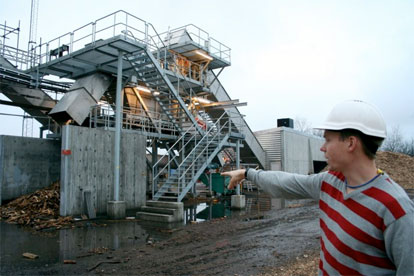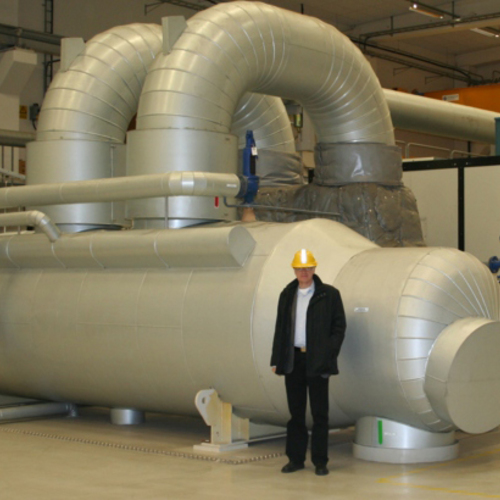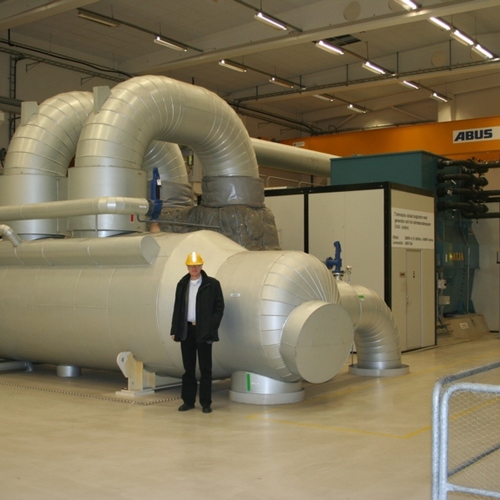
Image Credit: BuildingGreen
Last week, I addressed some of the benefits of capturing waste heat from power plants and distributing it to buildings—a technology referred to as combined heat and power or CHP. This week we’ll look at how this idea could be implemented in Brattleboro—using sustainably produced wood chips as the fuel source.
The idea of building a wood-chip-fired CHP plant in Brattleboro goes back to the fall of 2002 when Paul Cameron created a Brattleboro chapter of Cities for Climate Protection (now Brattleboro Climate Protection) to help Brattleboro reduce its carbon footprint. At one of Paul’s early meetings, Hervey Scudder, Rick Foley, and several others of us were brainstorming about how Brattleboro could reduce its carbon emissions, and the idea of a CHP plant using locally available, sustainably produced wood chips came up.
This might have remained just an interesting idea, but Hervey—who has long been involved with local energy issues including hydropower—pursued it actively. Over several years of quiet research, Hervey came across Dr. Morris Pierce of the University of Rochester, an expert on district heating systems. Morris visited Brattleboro to scope out the potential, and then gave a number of inspiring presentations in town, the first in January, 2007. Out of those meetings grew the organization Brattleboro Thermal Utility, or BTU, on whose board I serve.
Following the vision Morris originally laid out, BTU is pursuing the idea of building a power plant in town that would produce between 5 and 25 MW of electricity and perhaps twice that much energy in the form of heat that would be distributed in the more densely developed parts of town and to local industries. Individual buildings would have heat exchangers to extract heat from the circulating loop of hot water.
Adding some confusion to all this, another group is pursuing a somewhat different vision in which a handful of smaller, less expensive heating plants—rather than a single large plant—would be built around the town to feed heat into a district hot water network. Some of these could be at existing facilities that already operate small CHP or wood-chip heating plants. Their idea is to jump-start the construction of the district heating network with smaller plants, then eventually replace them with the same sort of CHP plant we are pursuing in BTU. Hervey Scudder is now involved with this alternative strategy.
So where are we now in moving toward CHP and district heat in Brattleboro? I can only speak to the efforts of BTU, but we’re at an exciting point. We’ve just issued a “request for qualifications” to identify a firm that can carry out a preliminary feasibility study for the project. This study will answer some important questions, including the following:
-
1. How large a plant should be built? We want to satisfy the heating needs of the town but also generate enough electricity to make the economics of the project work. There’s an economy-of-scale with power plants; operating a high-pressure steam turbine for electricity generation requires highly trained personnel, and with too small a plant we wouldn’t sell enough electricity to cover those costs.
-
2. Should the CHP plant be operated to satisfy the heating needs (referred to in the industry as “thermal following”), or should it be operated primarily for the electricity output—like a standard power plant? Our hope is to make enough money from electricity sales (and renewable electricity can earn a premium price in the market through “renewable energy credits”) to keep the distributed heat as affordable as possible, satisfying one of the goals of BTU.
-
3. If the plant is operated primarily for its electricity, what do we do with the excess heat during times of year when it’s not needed for heating? We are hoping to identify year-round, industrial thermal loads—or even attract new, sustainable businesses to Brattleboro for the affordable heat. We will also be considering distributed cooling—using the waste heat during the summer (odd as it sounds) to operate an absorption chiller that can produce chilled water that we can distribute for air conditioning buildings.
- 4. What organizational structure will work best for BTU? We are currently a community-based nonprofit organization, but would a different ownership structure be needed to attract the capital for building a power plant and distribution network that will likely cost tens of millions of dollars? How will we maintain local control? Should the system—or the piping network—eventually come under some sort of public ownership? Does a public-private partnership make sense?
We don’t know the answers to these questions. Our board includes energy and business expertise, but not the specialized knowledge needed to answer even these fundamental questions. We’re looking for the feasibility study to do this. We’ll keep you posted!
If we succeed in this vision and—in five or six years—have a state-of-the-art, clean-burning, biomass-fired CHP plant and a piping network to distribute affordable hot water throughout town, this will be the first system like it in the country. There are lots of systems like this in Europe, but the only district heating systems in the U.S. are in the downtowns of our largest cities (most of them distributing steam, which is inherently less efficient and more dangerous) and on university and hospital campuses. Brattleboro could become the first small town to demonstrate the future of renewable power generation and distributed heat. More information about this project, and a list of BTU board members, can be found at brattleborothermalutility.org.
Weekly Newsletter
Get building science and energy efficiency advice, plus special offers, in your inbox.













0 Comments
Log in or create an account to post a comment.
Sign up Log in